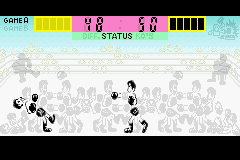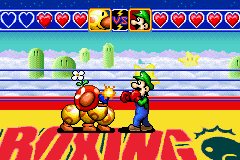Boxing: Difference between revisions
mNo edit summary |
No edit summary |
||
| Line 16: | Line 16: | ||
'''''Boxing''''' is a [[Game & Watch]] game that was released as a part of the Micro Vs. series on July 31, 1984. It was the first game in the Micro Vs. series. It was released as '''''Punch-Out!!''''' on September 3, 1984, in the United States and Europe. ''Boxing'' is one of the games in the [[Museum|Gallery Corner]] in the original ''[[Game & Watch Gallery]]''. It is also featured as a [[minigame]] in ''[[Game & Watch Gallery 4]]'', which includes an updated "Modern" version of the game. | '''''Boxing''''' is a [[Game & Watch]] game that was released as a part of the Micro Vs. series on July 31, 1984. It was the first game in the Micro Vs. series. It was released as '''''Punch-Out!!''''' on September 3, 1984, in the United States and Europe. ''Boxing'' is one of the games in the [[Museum|Gallery Corner]] in the original ''[[Game & Watch Gallery]]''. It is also featured as a [[minigame]] in ''[[Game & Watch Gallery 4]]'', which includes an updated "Modern" version of the game. | ||
[[File:BX-301 Bell1.gif|thumb|left|The alarm bell]]The alarm indicator of this game is a bell that is located beside the gong man, and the bell flashes when the alarm goes off. | |||
==Gameplay== | ==Gameplay== | ||
Revision as of 13:32, August 3, 2019
- This article is about the Game & Watch game. For other uses of the term "Boxing", see Boxing (disambiguation).
Boxing is a Game & Watch game that was released as a part of the Micro Vs. series on July 31, 1984. It was the first game in the Micro Vs. series. It was released as Punch-Out!! on September 3, 1984, in the United States and Europe. Boxing is one of the games in the Gallery Corner in the original Game & Watch Gallery. It is also featured as a minigame in Game & Watch Gallery 4, which includes an updated "Modern" version of the game.
The alarm indicator of this game is a bell that is located beside the gong man, and the bell flashes when the alarm goes off.
Gameplay
Classic version
Two boxers start with 50 stamina points each. The player starts with a maximum of five energy bars, while the opponent starts with two. For each hit a boxer takes, he loses one point. If pushed back, that boxer loses three points. If KO'd, the boxer loses four points, and an additional point is deducted for each TKO the boxer gets (up to −7 points).
A boxer's energy bars reset when he gets pushed back or when he gets up from the canvas. Every time he gets up from the canvas, he receives one energy bar fewer than the previous number. When the number reaches two, the reduction stops. If a boxer has zero points, he receives only one energy bar, and if KO'd with zero points, the boxer loses the match. After each time the player defeats their opponent five times, the opponent's energy bars increase by one (up to five). If the human player boxer loses a match in a one-player game, a Game Over occurs. If the boxers continue fighting after nine rounds, the boxer with more points wins. If both boxers have the same number of points after nine rounds, the game ends in a draw.
If a round takes too long, a brief break occurs, and the match resumes.
Game B features a two-player mode in which both boxers start with five energy bars. However, the first player can choose how many energy bars the second player can have, as a handicap game.
In Game & Watch Gallery 4, one star is earned for every three wins.
Modern version
The Modern version of the game features Luigi as a playable character. This version has three opponents: a Wiggler, a Big Boo, and Waluigi. Luigi has to beat all his opponents. After that, he has to repeat the fighting order along with winning a coin, a trophy, or a Championship Belt. Luigi and his opponents start with five hit points each, and they reset to five each time one of them gets pushed back. As the player advances in the game, the enemies get more difficult to defeat.
Getting one KO earns a coin, getting five earns a Yoshi Coin, getting ten earns a trophy, and getting fifty earns a Championship Belt. It is Game Over if Luigi gets KO'd.
Unlike in the Classic version, music is featured.
If the player selects the game yet waits several seconds, a humorous sequence will play. Specifically, several Waluigis pop up from the floor, and a Big Boo throws his boxing glove Boo at them in a similar manner to a bowling ball, and is overjoyed at getting a strike.
Controls
 (up and down): Raise and lower
(up and down): Raise and lower (left and right): Return or dodge
(left and right): Return or dodge and
and  : Punch
: Punch
External links
| Game & Watch games | ||
|---|---|---|
| Super Mario franchise | Donkey Kong (1982, MS) • Mario Bros. (1983, MS) • Mario's Cement Factory (1983, TT/NWS) • Mario's Bombs Away (1983, PS) • Donkey Kong Hockey (1984, MVS) • Super Mario Bros. (1986, CrS | 1987, Sp | 1988, NWS) • Mario the Juggler (1991, NWS) • Game & Watch: Super Mario Bros. (2020, CoS) | |
| Donkey Kong franchise | Donkey Kong (1982, MS) • Donkey Kong Jr. (1982, NWS | 1983, TT & PS) • Donkey Kong II (1983, MS) • Donkey Kong 3 (1984, MVS) • Donkey Kong Circus (1984, PS) • Donkey Kong Hockey (1984, MVS) | |
| Miscellaneous | Green House (1982, MS) | |
| MS: Multi Screen • TT: Table Top • PS: Panorama Screen • NWS: New Wide Screen • MVS: Micro VS. System • CrS: Crystal Screen • Sp: Special • CoS: Color Screen | ||

